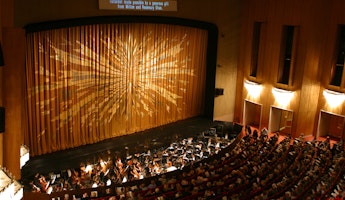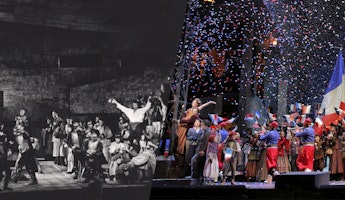Blog
March 27, 2024
Operas with Disastrous Premieres
First impressions are important, especially in opera. A show’s opening performance can make or break it and if the opening is a disastrous one, the opera is almost surely bound to fade into obscurity. Almost surely, but not quite. This season saw us stage two operas with famously negative receptions on their opening nights that are now mainstays in the repertoire: The Barber of Seville and La Traviata (our jaws dropped too when we first heard of this). With the opening night of our own La Traviata almost here, we wanted to look at other operas with less-than-ideal openings that still managed to stand the test of time.
Madama Butterfly
It may seem surprising that composers like Rossini, Verdi and Puccini had disastrous openings, but when you have a catalogue like theirs it’s a challenge to meet demands even if you deliver an operatic masterpiece. Before Madama Butterfly, Puccini was already regarded as a genius thanks to the success of La Bohème and Tosca. But things were already looking bad for Butterfly even before its premiere at La Scala when Puccini was nearly crushed to death in a horrific car crash on February 25, 1903. His severe injuries resulted in a limp for the rest of his life, and he also discovered that he was suffering from diabetes. His injuries and newly found disease delayed the composition for Butterfly, which in turn led to inadequate rehearsals before an immovable deadline for opening night of February 17, 1904.
To make matters worse, opening night saw many of Puccini’s enemies and detractors show up determined to tear the opera apart. Though the premiere had stars like Rosina Storchio and Giovanni Zenatello in lead roles, the lack of rehearsal was apparent, and many audience members booed and jeered throughout the show. In fact, the opera’s most famous aria “Un bel di” was initially met with silence. Storchio would also undergo a major costume failure when a gust of wind caused her kimono to billow, leading audience members to shout, “The butterfly is pregnant." The critics tore the opening and Puccini’s music apart, but Puccini didn’t give up on his opera, revising it extensively and premiering the new version three months later. This performance saw major success and helped make Madama Butterfly one of the most performed operas of the 20th century.
Tannhäuser
Tannhäuser is an especially interesting case since Wagner revised the opera so much it essentially had three premieres. It’s also a case of changes worsening the original and adding a new set of problems. While the original premiere was not nearly the success that Wagner’s previous opera Rienzi had been, it also wasn’t booed and jeered like Madama Butterfly or The Barber of Seville had been. Wagner continued to revise the opera but remained dissatisfied with it. Wagner would get another chance to give Tannhäuser a successful opening when in 1861 Emperor Napoleon III requested for the opera to be performed at the Paris Opéra. The stakes were high for Wagner, who needed to re-establish himself after being exiled from Germany in 1849. However, the Paris Opéra had a tradition that every show performed there must contain a ballet in Act 2. Wagner would include a ballet in Tannhäuser but placed it in Act 1.
Come opening night, the opera was well-received initially, but whistles and catcalls began to fill the theater in Act 2 and were nonstop by Act 3. Wagner would try to remove the elements that caused the initial mockery for the second night, but this performance saw even more disturbances thanks to a group of wealthy aristocrats called the Jockey Club. They were outraged to have missed the ballet, since they always showed up during Act 2 and refused to change their dining schedules so they could make the beginning of the opera. Because of this, they encouraged audience disturbances, making it an even noisier performance. Wagner would not attend the third performance which saw so much uproar that the opera had to be paused several times. After more revisions, the opera had its premiere in Vienna in 1875, and at last the opera got the premiere it deserved. While Tannhäuser is now regarded as a masterpiece, the uproar from the Paris Opéra premiere single-handedly ended Wagner’s hopes of establishing himself in Paris.
Carmen
While the previous operas saw disaster due to production issues, Carmen caused outrage due to the opera's content. By all accounts, Carmen should’ve been a hit from the very start with a cast of rising stars and genre elements that made it ahead of its time. But much alarm was raised about Carmen’s nature as an amoral character who did as she pleased. Many of the management would urge Bizet to tone down the work, especially because the opera was to be performed for an Opera-Comique audience, who expected a more lighthearted and traditional story. Bizet refused and was supported by members of the cast.
So, Carmen premiered on March 3, 1875, in all its glory, and was attended by Paris’ leading musical figures. The first act went smoothly but the audience started to become colder in Act 2. They only applauded once in Act 3 and were ice cold throughout Act 4. While many of Bizet’s composer friends were blown away by the opera, audiences were shocked by its realism and the more conservative audience members and critics hated the heroine, wishing for a “woman of virtue” to have been the lead instead. While some critics praised it, it wasn’t enough to raise the show’s popularity and it had to compete with performances of Verdi’s Requiem, which saw far greater success. Carmen would be performed to half-empty opera houses with management giving away tickets in mass hoping that people would come to fill the theater.
Unlike the previous operas on the list, Carmen wouldn’t see any revisions from Bizet due to his sudden death on June 3, 1875. His friend Ernest Guiraud would make slight revisions to help the opera fit better into the “grand opera” format. After Bizet’s death, interest in Carmen would grow in France and the original cast would come back that year to perform the opera again in honor of Bizet. These later performances would draw in legends such as Wagner, Brahms and Tchaikovsky, who all praised the opera. Brahms reportedly watched it 20 times and Tchaikovsky wrote that “Carmen is a masterpiece in every sense of the world...one of those rare creations which expresses the efforts of a whole musical epoch.” Bizet’s passing coupled with the praise of these composers helped establish Carmen’s longevity and legacy, with many recognizing that the opera had been a work of genius all along. Now Carmen is a mainstay in the repertoire and, just like the rest of the list, is one of the most performed operas of all time.
First impressions are important, but they’re not everything. An opera can premiere with flaws or be too ahead of its time for audiences' taste, but time has a way of being very kind to the greatest pieces of art. While these composers suffered from these disastrous premieres, we are still talking about and performing these operas in our own time and can’t imagine a world that doesn’t include them. If there’s one thing that these stories taught us, it’s that it’s better to believe and stand up for your work than to crack and give up under pressure. For if Puccini threw in the towel and worked on another opera, Wagner had withdrawn Tannhauser entirely or Bizet had given in and changed his vision we wouldn’t have the masterpieces that we have today.








/03-cosi/_dsc0996_pr.jpg?format=auto&fit=crop&w=345&h=200&auto=format)

















